Latest Revision Date: June 29, 2007
GT4 LAN Basics
The original GT4 manual was so incomplete that it was more of a product
description than a manual and it left players of the game to figure out
networking on their own. The replacement
GT4 manual at least has the basics for setting up a LAN now, but it
still
leaves
out many networking details and feature descriptions, plus it still has
at least one error. If you are
reading this
document looking
for help, I'm sure it is no surprise to you that networking GT4 can get
very complicated, but don't give up. Be prepared to take the time to
make one
work,
until you
are successful. While this document is not finished yet, it is as
detailed as you need now to put a working network together today.There are two normal ways to play GT4 over a Local Area Network (LAN): two consoles linked by one crossover cable; or 2 to 6 consoles linked through an Ethernet router (or switch, or hub). LANs can also have one or more TVs set as monitors, to broadcast to an audience.
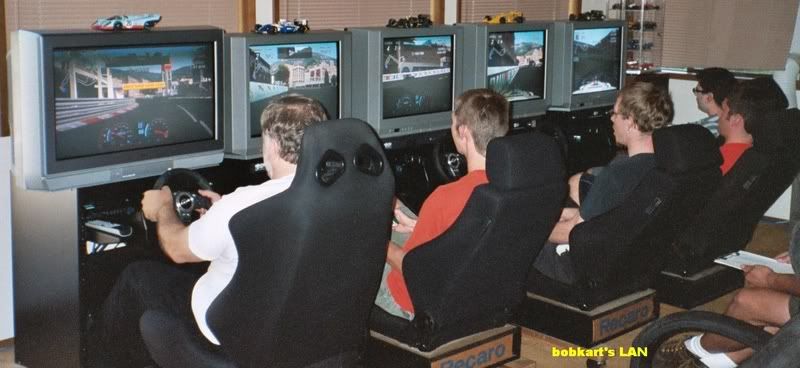
A special one-player LAN can also be made to have up to 5 surrounding multi-monitor "views" from 5 PS2 stations. Most often, this mode is used with 3 stations, as shown below.
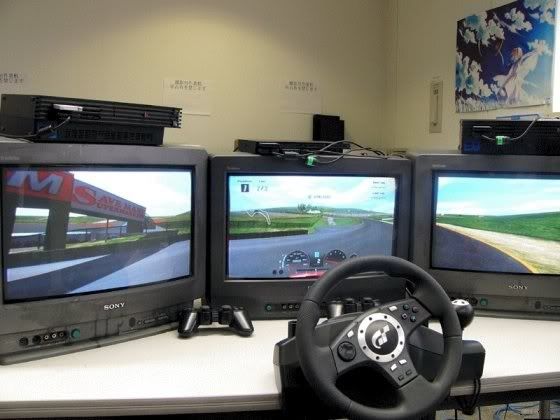
If you need to play GT4 over the Internet, then use the XLink tunneling software because GT4 had its own native on-line section removed just before its initial release. If you need to LAN GT3, go here.
If you and a friend only have one complete console "station" and want to play GT4 together, then the two of you must use Arcade mode's 2-Player Battle mode with one TV. You cannot LAN in 2-Player Battle mode, but this document has a short 2-player Mode Q&A section included because many players have common problems and questions about it, too.
Below, as a general rule to keep organised, text describing steps to be taken will precede the pictures.
This is a long document, so use the links or a browser's search mode to quickly find specific topics.
Equipment:
Use a paper pad, pencil and eraser, to keep good notes! The more players there are, the more complicated your network will be. Keep track of player's names, player IDs, console IDs, who brought what equipment, and so on. As much as you can, make setting up your LAN as idiot-proof and straightforward as possible.
Before you start setting up your LAN, give each console a unique ID number and use this number whenever you need to ID a console in a setting. To keep this obvious (and not just a mental exercise), use stickers to number the front of the consoles, where everyone can clearly see them. Use masking-tape and number each network cable end with the console's number on it, too. With up to six players involved in a LAN, you will appreciate doing this when you realise just how many cables need connecting here, there and everywhere. The following picture shows just some of the equippment that could be used for just a four-station LAN (in other words, labels are a cheap headache or blood-pressure medicine).
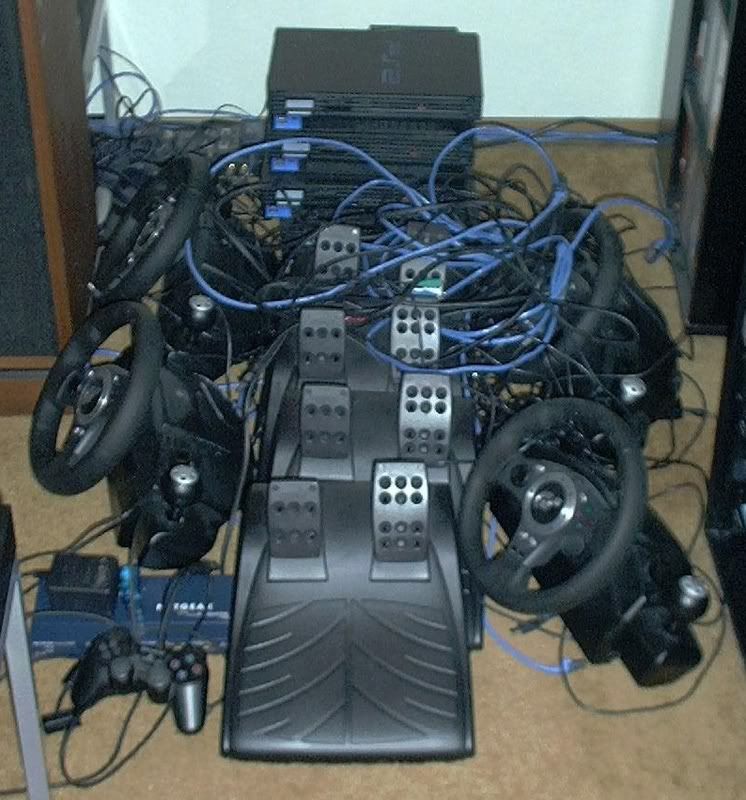
It really helps if each player has their own earphones. To make this as simple as possible, even though the sound quality may not be great, use a TV with an audio output jack for earphones because, when two or more TVs are producing similar sounds, it will be more difficult and confusing to do manual gear shifting if you can hear many sound effects from different sources, at the same time. This cacophony of engine sounds will probably annoy most non-GT fans, too, if they are within earshot. If you play with an audience, then use another PS2 station to broadcast to them and let them control which players to watch on a TV screen specifically for their own viewing.
All GT4 networking equipment must be Ethernet products. You will need at least one router (or switch, or hub) with enough ports or wireless channels to connect each console. The router can be entirely wireless or entirely wired, or it can have a combination of wired ports and wireless channels. If you have a 4-port wired/wireless router, which is very common now, you may need to combine other equipment into a hybrid network, by mixing wired and wireless equipment together, to get the maximum of 6 players connected. Please, read your equipment manuals!
What should you use: a router, a switch or a hub?
While a hub is described in the game's replacement on-line manual, it is the simplest equipment and, therefore, it may not be the best for you. A hub complicates setting up a LAN and it may add some lag because of data collisions, but they can also have a very large number of networking ports making them easy to connect all consoles to one device. A hub cannot be segmented, though. (If you are using a switch or hub, not a router, follow the instructions in the 2-console LAN section.)
Switches are smarter than hubs, they can also be wireless, and they can control packet collisions much better, making switches a big improvement over hubs. Switches can have a very large number of networking ports. If you want to network more than 4 players, you probably will want to use a switch with at least 6 ports or maybe 8 ports, so that you can broadcast races to an audience or to make recordings. If you also want to play the other PS2 sim that can LAN, ToCA 3, then you should probably get a switch with at least 8 or more ports. (If you are using a switch or hub, not a router, follow the instructions in the 2-console LAN section.)
Routers can do everything that a switch or hub can do and more, but most consumer models now have only 4 wired ports. Since routers have built-in switches, they can control data packet collisions, too, reducing the chances of getting lag. Routers also can have other built-in services, such as DHCP, NAT, DMZ, WAP and a firewall, some of which can help you more easily create a GT4 LAN. Routers are more commonly available in homes than switches or hubs and routers can help get the PS2 on-line with other games, so for some of what follows below, it will be presumed you are using a router in wired-mode, not wirelessly, unless the section involves setting up a routerless LAN.
Each player (or multi-monitor view) must have their own console system, to make a complete GT4 "station".
Each station on the LAN will need the following:
- an on-line ready PS2 console (the older PS2 models need a separate Network Adapter; slim consoles don't) or a PS3
- a TV, one with an earphone output jack is probably best (2-player Battle mode is not available over a LAN)
- a GT4 game disc
- a memory card with as many tracks and cars available as possible
(if necessary, copy a completed game file to a spare mem-card, for LAN
use)
- each memory card needs enough free space to create a network config file
- a normal Ethernet UTP network cable, Cat5e or better (a 2-console LAN needs one crossover cable)
- enough room to set everything up, including each TV, a wheel and seat for each player, if using them
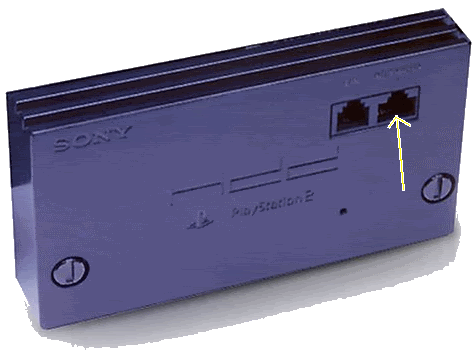

A routerless PS2 network uses a different cable than a network utilizing a router, since the PS2's Network Adapter doesn't MDI/MDIX auto-switch. Do not use a crossover cable to create a GT4 router LAN. Identify your Ethernet cables with the diagram below (View Image to see more detail). A normal Ethernet cable is also known as a "straight-through" or a "patch" cable. A "crossover" cable is also known as an "up-link" cable and this cable can also be used to link two or more networking devices together, to make a bigger LAN.
There are two EIA cable standards: T-568A and T-568B. Most consumer Cat-5 cables are T-568B and the following image shows the EIA T-568B standard wiring scheme. This should not normally be a problem nor a concern, but if you are uncertain about the cables, check to make sure both ends of all cables are wired properly according to their type - straight-through or crossover - the same as in this diagram. There should only be one wiring scheme per cable and throughout your network.
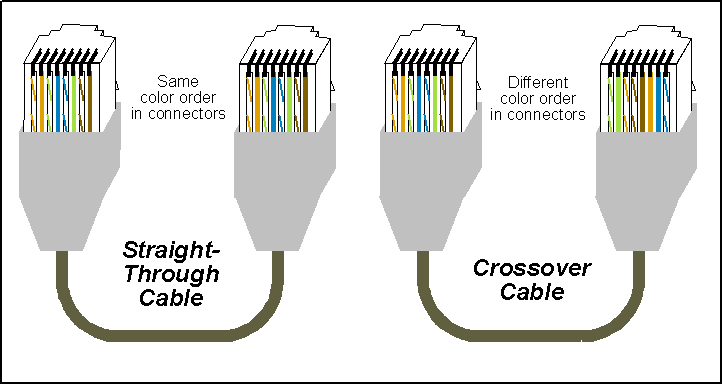
Instead of using the virtual keyboard (press Start when required), you can use a real USB keyboard with GT4 whenever you need to move the cursor, press Enter or type text for names. Use a USB 1.1 hub if you want a cheap solution to connecting more than one USB device to the PS2's USB port #2. USB Port #1 has to be reserved for a wheel, if you use one. Here is an example of a USB hub and flex-tubing to control some of the many wires, including those of the wheel, keyboard, chat headset (for use with ToCA) and USB memory device. One port is still empty and the extension cable allows connecting the fat USB memory device to the hub.
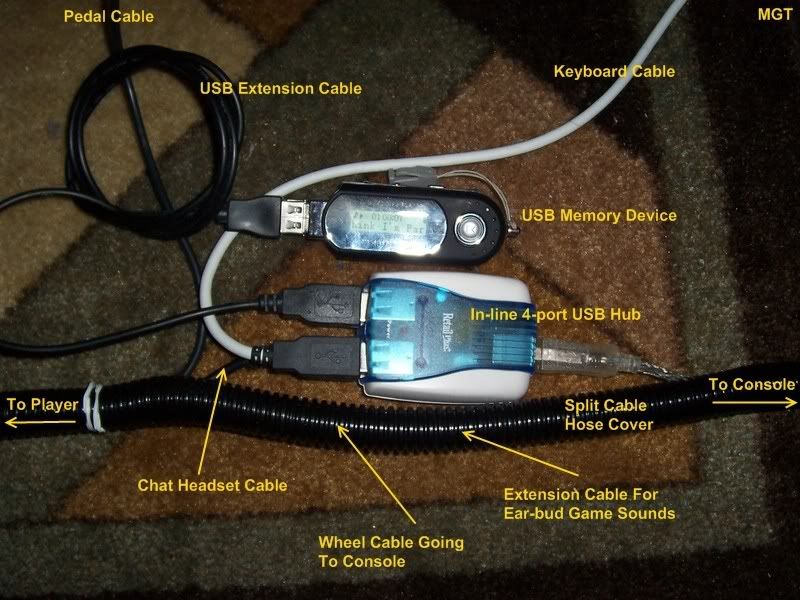
Configure GT4
Open Options/2 Player Battle to set up the basic parameters for LAN mode races: select the Number of Laps (1 to 50); Tire Wear (None, Mild, Strong); Handicap (-150 to +150), to adjust player starting postitions, in 5 meter increments of separation; Boost (None, Mild, Strong), to help slower players keep up with the leaders. All of these settings help to make any race more, or less, challenging.
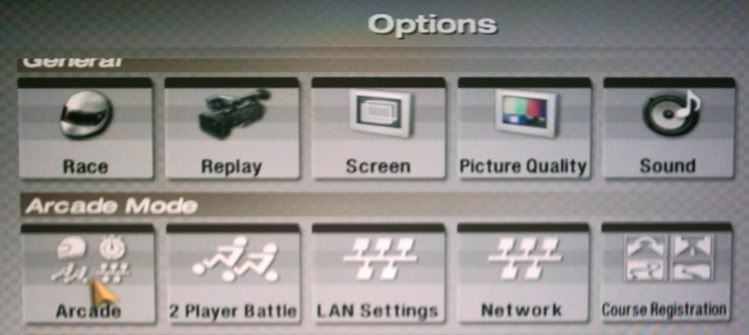
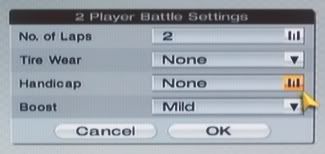
Choosing Tracks
On the host console, click on Arcade Mode/Course Registration to choose up to 30 Arcade mode courses or tracks you want to use, in general, for all Arcade modes. You unlock tracks by playing through additional days. There are some limitations, such as the maximum number of players or if the track is allowed in 2-player mode, depending on the type of cars or tracks they are, especially rally courses and open top cars. Not all consoles need to have the same tracks registered, though. You can register different tracks on different consoles and switch which console selects the next track. So, for example, if you want all 40 6-player tracks available, you can share them between two consoles and switch which console selects the track on which to race next. If your LAN has more players than what your registered courses can accomodate, the list will automatically reflect that by not displaying any tracks that can't handle the number of players on the LAN. For example, if there are more than two players on the LAN, 2-Player Max tracks are not available.You must exit LAN mode to change the Course Registration!
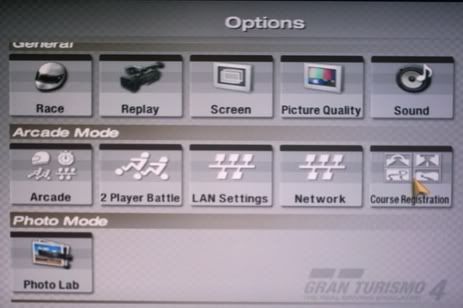
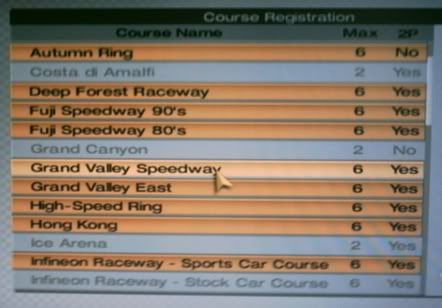
Choosing Cars
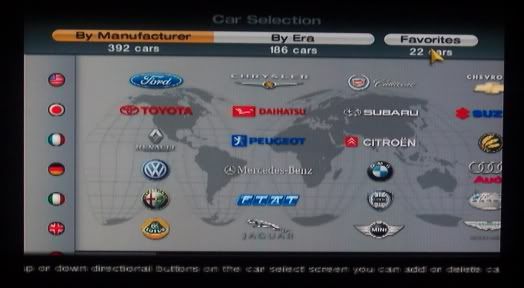

Once you have selected your Favorite Arcade cars, save your settings because you will not be able to change them once the LAN is created. You must exit LAN mode to change the selection of Favorite cars!
Your Arcade car selection can be chosen
by entering any Single Race, Time Trial or Multi-LAN race, in Arcade
mode. Once you see a car in the showroom, press the D-pad "Up" button
to toggle adding cars to your Arcade Favorites garage. If you don't
assign any cars to your Favorites "garage", then the game will give you
ten default race cars from which to choose; all other cars must be
unlocked by playing the game. Over a LAN, you can select
which car to use from a garage of no more than 30 of your Arcade cars,
at
Arcade mode's Car Selection screen on the manufacturers map. You are
not able to chose any cars from your Sim garage nor use your custom
settings, and no "special" cars can be used. LAN cars are not allowed
to be tuned in any way, except by picking the transmission type,
driving aids and tires.
Just before you start a race, after the track has been chosen, if you have cars in your "Favorites" garage, the cars will be displayed with a yellow checkmark, in the order they were added to the garage. Press X to select one car; press the Up arrow to remove a car from your favorites, so be careful when using the D-pad. If you want different cars in your Favorites garage, then use the manufacturer's map again, to locate them.
Just before you start a race, after the track has been chosen, if you have cars in your "Favorites" garage, the cars will be displayed with a yellow checkmark, in the order they were added to the garage. Press X to select one car; press the Up arrow to remove a car from your favorites, so be careful when using the D-pad. If you want different cars in your Favorites garage, then use the manufacturer's map again, to locate them.


Once you have selected your Favorite Arcade cars, save your settings because you will not be able to change them once the LAN is created. You must exit LAN mode to change the selection of Favorite cars!
Network Settings
In Options/Network/Network Settings,
make sure "Auto
connection" is set to "No", as recommended by the game's scrolling
instructions. This will allow you to change settings
without the console always trying to automatically join a network when
you may not be ready. This setting is independent from all other
consoles, so some can be set to auto-connect, while others can be set
to not auto-connect. When everything is set and works properly, and if
you may never want to change settings again, you can permanently set
"Auto Connection" to "Yes", to make it more convenient to
rejoin a network. If Auto Connection
is set to "Yes", each console must have a
unique Connection ID number.
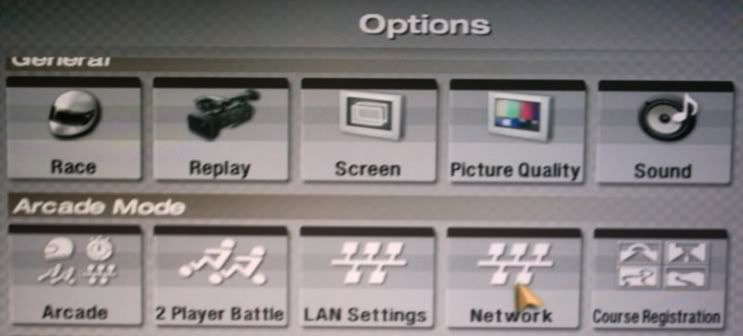


LAN Connection Settings
There are two connection types: host and player. Everything that you are allowed to do depends on what role each console has been given.
Host Settings
In Options/Arcade Mode/LAN Settings, set which console represents the host. No other player must be set as the host! Only the host's settings will govern the number of players, the number of multi-monitor consoles (if you have any) and what amount of network capacity the game will try to use.
The host's console will always be used for racing, never as an audience console nor a sub-monitor console.
The host's car is always the first car on the grid.
Console Name
This is the console's and player's name used to ID a player during game play, so choose it well and make it unique.
Style
Style sets the "role" of the console. Normally, this will be set to "Play". If broadcasting to an audience, chose "Live". If the console is being used as a sub-monitor in a Multi-monitor set-up, then chose "Monitor".
Single Player LAN
If you are setting up a single-player LAN, for Multi-monitor play, then change the settings for the number of monitors and to control each view. A monitor console can be used for taping replays easlier or broadcasting to an audience. Check the player (non-host) section below, for some more details about settings only the player consoles control.
No. of Players
The exact number of players must be set correctly or else the connection will hang while waiting to connect to other consoles that don't exist on the network. If you change the number of consoles on the network, you must change this number, too!
No. of Monitors
This section of LAN Connection Settings deals with a Multi-monitor set-up, for one player to use more than one TV. The slider adjusts from 0 to 10, but there are only 5 views. One console must still be the host; the rest are sub-monitors. Image
Monitor Position
The 6 different views face towards the Center, Left, Right, Top Center, Top Left and Top Right directions.
Monitor Type
Usually, this will be set as "Normal". S-type is an optimised setting for use with 3 monitors, such as in the "S"ubaru simulator.
The Monitor's display will not have any overlays, not even the game's logo, just the environment and the cars, so its view makes for an interesting recording. After a replay is finished and after the white GT logo is displayed, the monitor's screen is blanked until the next race starts.
A monitor will play the background music, too, unless it is turned off (in Options/Sound) for that console.
Each monitor can have its colour qualities and brightness configured by the game, in Options/Picture Quality Settings/TV Live Replay Views.



LAN Connection Settings
There are two connection types: host and player. Everything that you are allowed to do depends on what role each console has been given.
Host Settings
In Options/Arcade Mode/LAN Settings, set which console represents the host. No other player must be set as the host! Only the host's settings will govern the number of players, the number of multi-monitor consoles (if you have any) and what amount of network capacity the game will try to use.
The host's console will always be used for racing, never as an audience console nor a sub-monitor console.
The host's car is always the first car on the grid.
Console Name
This is the console's and player's name used to ID a player during game play, so choose it well and make it unique.
Style
Style sets the "role" of the console. Normally, this will be set to "Play". If broadcasting to an audience, chose "Live". If the console is being used as a sub-monitor in a Multi-monitor set-up, then chose "Monitor".
Single Player LAN
If you are setting up a single-player LAN, for Multi-monitor play, then change the settings for the number of monitors and to control each view. A monitor console can be used for taping replays easlier or broadcasting to an audience. Check the player (non-host) section below, for some more details about settings only the player consoles control.
No. of Players
The exact number of players must be set correctly or else the connection will hang while waiting to connect to other consoles that don't exist on the network. If you change the number of consoles on the network, you must change this number, too!
No. of Monitors
This section of LAN Connection Settings deals with a Multi-monitor set-up, for one player to use more than one TV. The slider adjusts from 0 to 10, but there are only 5 views. One console must still be the host; the rest are sub-monitors. Image
Monitor Position
The 6 different views face towards the Center, Left, Right, Top Center, Top Left and Top Right directions.
Monitor Type
Usually, this will be set as "Normal". S-type is an optimised setting for use with 3 monitors, such as in the "S"ubaru simulator.
The Monitor's display will not have any overlays, not even the game's logo, just the environment and the cars, so its view makes for an interesting recording. After a replay is finished and after the white GT logo is displayed, the monitor's screen is blanked until the next race starts.
A monitor will play the background music, too, unless it is turned off (in Options/Sound) for that console.
Each monitor can have its colour qualities and brightness configured by the game, in Options/Picture Quality Settings/TV Live Replay Views.
Network
Traffic
The Network Traffic settings controls
the amount of bandwidth used by a LAN. If you are sharing the network
traffic with a computer while playing a LAN game, you may want to
select Light, but if only GT4
is using the network, then select Heavy.
If lag is a problem, use the setting which causes the least problems,
probably Heavy. Here is something to think about: if the game is able
to alter the amount of data traffic over the network, just what is
changed? Hmmm...
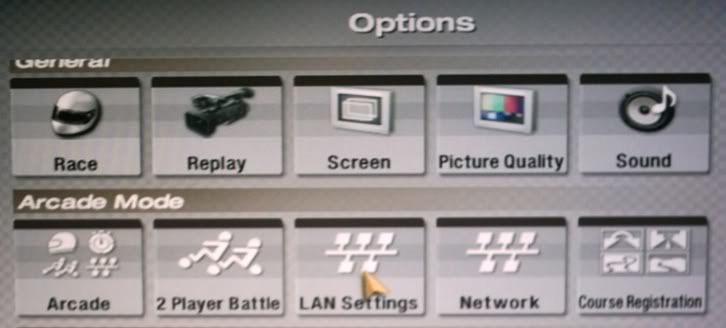
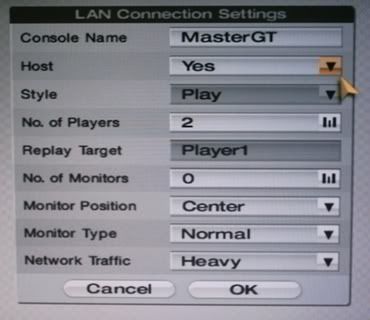
Player Settings


Some Player settings (Console Name,
Monitor Position, Monitor Type) are the same as for the host, so
refer
to their descriptions, above, in the host section.
Host
Players cannot be hosts, so set this to No.
Style
Player consoles (non-hosts) can be set as Play, Live or as an audience Monitor. Play is the normal competition mode, Live is for broadcasting to an audience and Monitor is to configure the console in a multi-monitor set-up.
Replay Target
Each non-host console can be set to pick which player's replay will be shown on its TV.
To connect 7, or more, PS2's together, with 6 drivers and the rest being controllable spectator views, you need to have "Number of Players" set to 6, and Number of Monitors set to the number of additional PS2s. Each of the "Player" PS2s have to be set to "Play", and each of the audience (controllable spectator) PS2s have to be set to "Live". SONY does not recommend using more than 6 consoles on the network, though, to help keep it stable.
Lastly, the Replay Target gadget of each spectating PS2 must be empty! Contrary to the game's manual, if there are any characters in the Replay Target gadget, then the game will give you a view of the sky and you will not be able to drive properly. The replay will be messed up in a similar way, too.
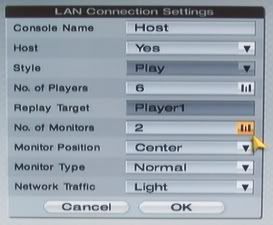
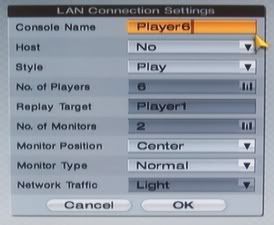
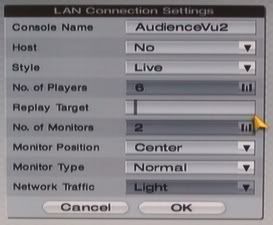
What do the "connecting" dots mean?
At the "Waiting for Connection" screen, the dots beside the "Cancel" instruction, in the black bar at the bottom of the screen, indicate the stage at which the network is at while connecting each console. Pay attention to them, at first, especially if you are having trouble.
When a host console tries to join a network, the host's screen will have one dot.
A player or monitor console will have three dots when not connected to the host yet, then two dots will show briefly after a connection is established with the host, and then everyone's dots disappear as the LAN game starts.
If no dots get displayed, even for just one console, or if a console gets stuck at two dots (Is the number of players set wrong?), reboot all consoles. If the dots still don't appear, then recheck settings and recheck your hardware and cable set-up.
Host
Players cannot be hosts, so set this to No.
Style
Player consoles (non-hosts) can be set as Play, Live or as an audience Monitor. Play is the normal competition mode, Live is for broadcasting to an audience and Monitor is to configure the console in a multi-monitor set-up.
Replay Target
Each non-host console can be set to pick which player's replay will be shown on its TV.
To connect 7, or more, PS2's together, with 6 drivers and the rest being controllable spectator views, you need to have "Number of Players" set to 6, and Number of Monitors set to the number of additional PS2s. Each of the "Player" PS2s have to be set to "Play", and each of the audience (controllable spectator) PS2s have to be set to "Live". SONY does not recommend using more than 6 consoles on the network, though, to help keep it stable.
Lastly, the Replay Target gadget of each spectating PS2 must be empty! Contrary to the game's manual, if there are any characters in the Replay Target gadget, then the game will give you a view of the sky and you will not be able to drive properly. The replay will be messed up in a similar way, too.



What do the "connecting" dots mean?
At the "Waiting for Connection" screen, the dots beside the "Cancel" instruction, in the black bar at the bottom of the screen, indicate the stage at which the network is at while connecting each console. Pay attention to them, at first, especially if you are having trouble.
When a host console tries to join a network, the host's screen will have one dot.
A player or monitor console will have three dots when not connected to the host yet, then two dots will show briefly after a connection is established with the host, and then everyone's dots disappear as the LAN game starts.
If no dots get displayed, even for just one console, or if a console gets stuck at two dots (Is the number of players set wrong?), reboot all consoles. If the dots still don't appear, then recheck settings and recheck your hardware and cable set-up.
Notes:
- I would like to thank bobkart for reviewing this information and
catching errors, omissions and making suggestions for improvements, and
for use of a picture of his LAN. His experience with GT LANs made this
a better document. I would also like to acknowledge the early LAN
players who figured out how to get a LAN working with almost no useful
documentation from SONY. The game's manual still is incomplete and
it still has errors regarding some of the LAN details making this
document
necessary.
- You can ignore the On-line set-up disc that comes with the
Network Adapter. GT4 itself has all of the software tools you need for
creating a LAN.
- A config file will only work on one PS2 console. If a memory card is inserted into a different console, you will not be allowed to use this config file to create a LAN, for security and other reasons. If you want to LAN using a memory card with a different console, you will need to create a new config file.
- Save your changed settings often, especially if you figure you
will reset the consoles often. It will save having a lot of frustration.
- You can make more than one config, to handle different types of
LANs you might join. For example, you may be using a router at home,
but you may visit a friend and just use a crossover cable to connect
your console to his.
- If it seems the networking equipment is confused and won't connect when you think it should, if you see the warning that a console had been "Disconnected", if Cancelling a LAN connection does not work, or if the game crashes or hangs, then reset each console and start over. You should only need to do this once per problem, though. If that doesn't solve your problem, the cabling, IP and other settings probably need rechecking.
- If the LAN seems slow and if one console seems slower than the rest, don't make it the host console, or just remove the slow console from the LAN.
- Contrary to the GT4 manual, any
player can chose the track and start, pause or exit the race or replay.
Be careful of accidently controlling the race.
- If you want to change tracks in the Course Registration or favorite cars after you create a LAN, you will need to reset the host console.
- If you wish to video record the LAN race, you must be prepared to
do so during the race or immediately after the race finishes.
There
will be no other chance of repeating a LAN replay. The replay will
allow different controls, such as using Dive mode and music.
- LAN replays cannot be saved.
- mixed LANs, with PAL and NTSC console versions, will not work
- If you plan on putting on a demonstration before an audience,
practice setting up the LAN properly first, and keep good notes.
- When you are finished with LAN play and you want to do something
else with your PS2s, you must reset at least one console because the
Start and Triangle buttons are inactive. The rest of the consoles will
automatically return to Arcade mode or they can be reset, as well.
Choose the LAN type you need
2 Players (1 crossover cable only, no router)
2-6 players (using a switch or hub)
2-6 Players (using a router)
2-Player Mode (Split-screen, one TV)
Setting up an Audience Monitor
Live
This section describes how you and a
friend can set up a GT4 LAN with the least amount of extra hardware.
Basically, a crossover cable is all you really need to join two on-line
ready PS2
consoles together. The easy part is just connecting the crossover cable
to the Ethernet
port on each console.
Follow the basic instructions, in the top section, for picking tracks, favorite cars and turning Auto-connect off before configuring the IP section. Now you are ready to set up the 2-player LAN itself.
Quick Summary
- assemble all hardware normally and link the two consoles with a crossover cable, run the game
- select the cars and the tracks you want to use and race conditions (number of laps, etc.), in general, for Arcade mode
- turn off Auto Connect, until the LAN works
- make a network config file for each console, if there isn't one, and name it appropriately
- set which console is the host and which is the player
- set the number of players to 2
- turn off DHCP and enter the unique IP information properly
- save your new settings, if you want to make them permanent
- join the LAN (watch the dots to see if it is working) and race
Select Multi-LAN Race. This mode will let you start a LAN race or start a Multi-monitor session.
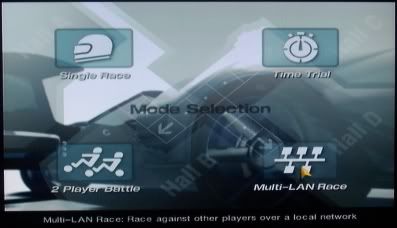
If you have no network config file on the memory card now, when you try to enter Multi-LAN mode, you will be prompted with a notice and a requester which leads you to making one. Click OK and accept the following settings as they are. If there already is a config file on the memory card that was created on another console, you will be prompted to delete it! You must now either delete the old config file or load a compatible one from another mem-card.
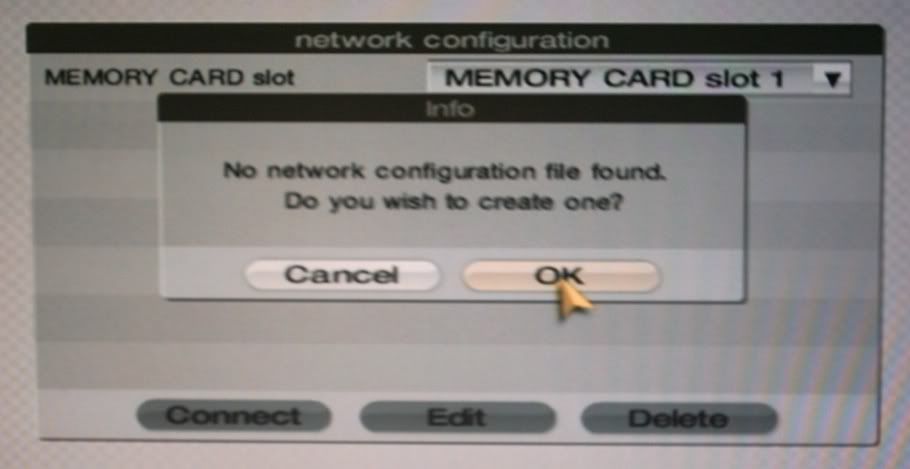

You are now presented with the actual
network configuration menu. Enter your player name, using the
on-screen keyboard (press the
Start button) and when you are finished, click on "RET"urn. Erase with
the Back space key (BS) and use L2 to toggle uppercase and lowercase.
Choose this
unique name well because it will represent you during game play.

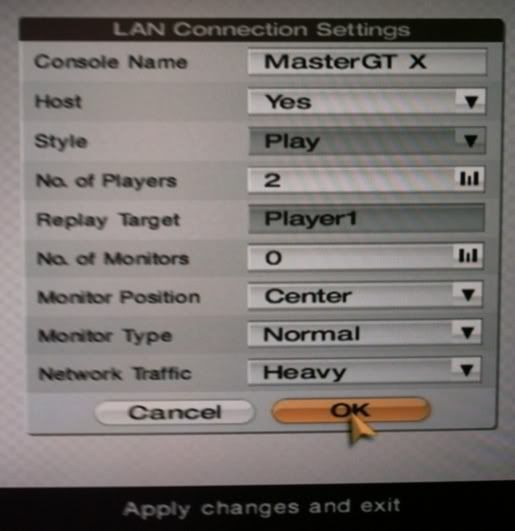
Because there is no router involved with
a crossover cable network,
turn DHCP Off. Each console's
last quad number of the IP address (192.168.0.N) must
be different! For example, use (192.168.0.1) to identify one
console and (192.168.0.2) to
identify the second console. Each console
must have a unique 4th quad number for its IP address.
Set all console netmask values to 255.255.255.0, as shown below, because this netmask value allows the specific host address to be visible over a network.
The default router quad should be identical on each console but different than any IP address already used.
You may leave "Use auto DNS" set to "Yes", since it doesn't interfere.
When everything is set properly, click OK.
Set all console netmask values to 255.255.255.0, as shown below, because this netmask value allows the specific host address to be visible over a network.
The default router quad should be identical on each console but different than any IP address already used.
You may leave "Use auto DNS" set to "Yes", since it doesn't interfere.
When everything is set properly, click OK.
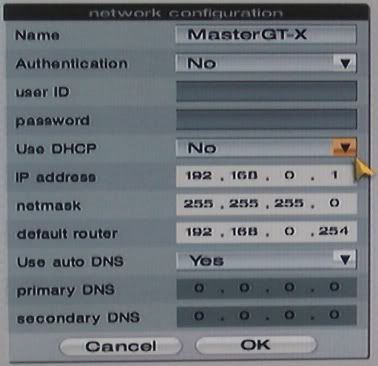
After you set the IP numbers, click
OK to
create the config file on this memory card. Remember, config files are
not usable on other consoles!
The consoles will now try to communicate with each other. Check the connecting "dots", to make sure each console is connecting as it should be. If you don't have a connection within about 10 seconds, something is set wrong. You should not have to stare at the "Waiting for connection..." screen for more than that.
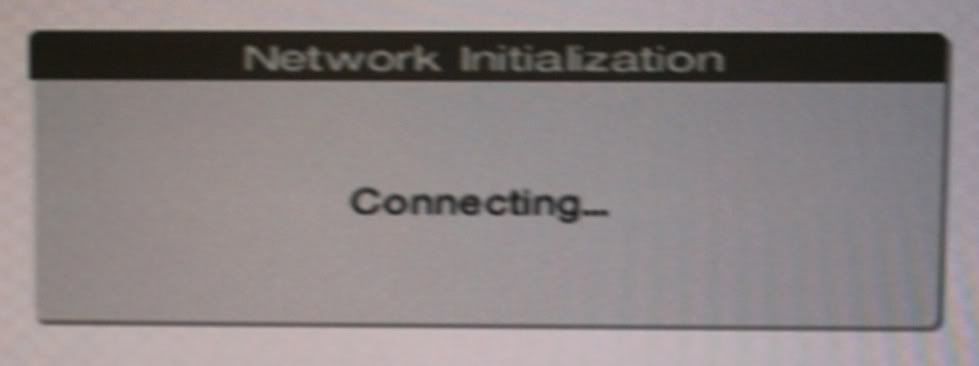
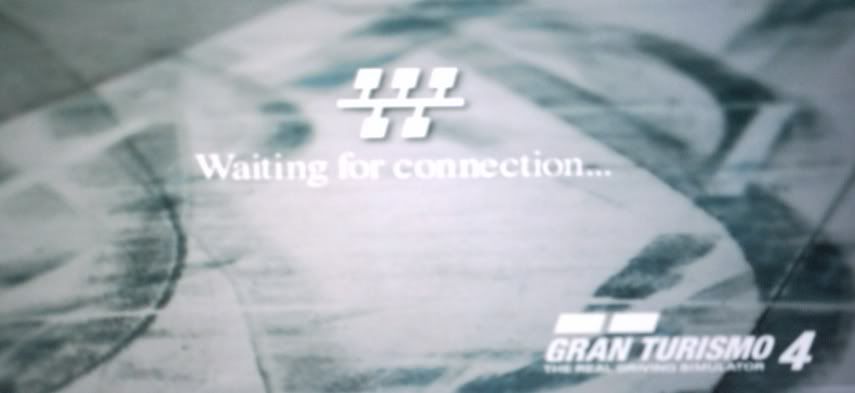
The consoles will now try to communicate with each other. Check the connecting "dots", to make sure each console is connecting as it should be. If you don't have a connection within about 10 seconds, something is set wrong. You should not have to stare at the "Waiting for connection..." screen for more than that.


Once everyone is connected, select your track, car and driving options.
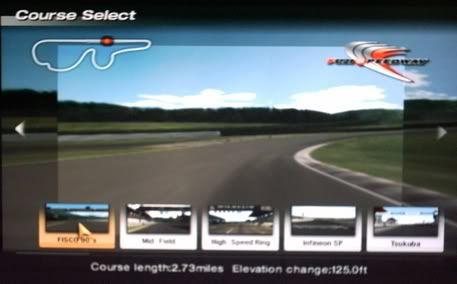
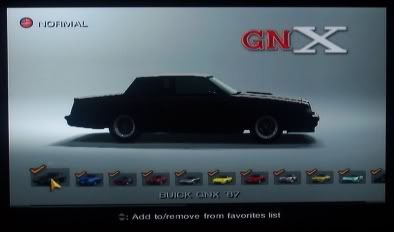
After both cars are selected and adjusted, you will get the 3, 2, 1, 0 Pre-Grid countdown and a LAN race will start.
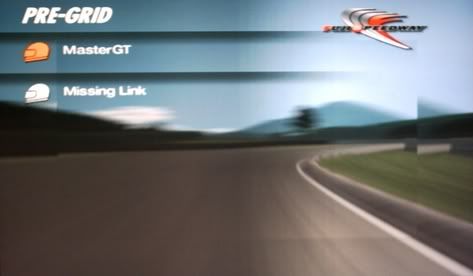
Let's race!
This section describes setting up a GT4
LAN for up to 6 players, based
on an Ethernet
router. This method is somewhat easier
to configure than using the crossover cable method, or if using a
switch or hub, because you can let
the DHCP
system in the router set up your IP configuration automatically. No
mess, no fuss!
Wire the consoles to the router. Just
make sure you are
using normal networking cables and not any crossover cables. Many
routers only have 4 wired ports, though, so you may have to use some
wireless
bridges, or wireless game adapters, or an extra switch to get the full
LAN of six players working,
depending on what you use as a router. It is more convenient and less
expensive to use a switch with at least 6 ports, if you have 5 or 6
players.
Follow the basic instructions, in the top section, for picking tracks, favorite cars and turning Auto-connect off before configuring the IP section. Now you are ready to set up the router LAN itself.
Follow the basic instructions, in the top section, for picking tracks, favorite cars and turning Auto-connect off before configuring the IP section. Now you are ready to set up the router LAN itself.
Quick Summary
Select Multi-LAN Race. This mode will let you start a LAN race or start a Multi-monitor session.

If you have no network config file on the memory card now, when you try to enter LAN mode, you will be prompted with a notice and a requester which leads you to making one. Click OK and accept the following settings as they are.


You are then presented with the actual IP configuration menu and its Name is blank.
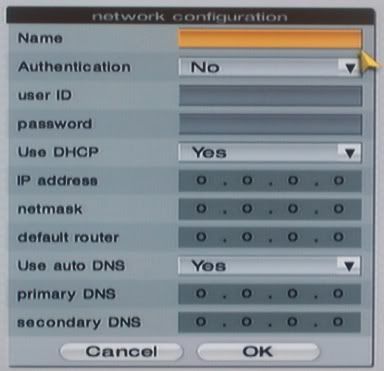
Enter the player's name using either the virtual keyboard or a real keyboard. This name will only identify the player in the Pre-Grid screen (it would have IDed the player while on-line, if GT4 had an on-line mode). You can ignore the Authentication settings, since they deal with signing-in while on-line. Leave "Use DHCP" and "Use auto DNS" set to "Yes" and click OK to save the configuration file. Once you have created and saved an IP configuration, you may never need to change it again, so long as nothing else about the network changes, of course.

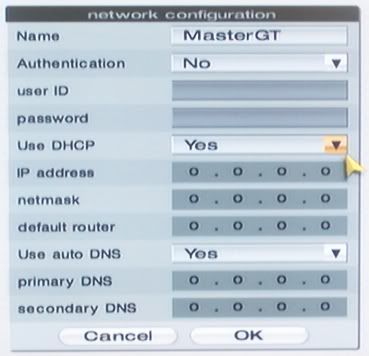
After you accept the IP configuration, you are then shown all available configurations. At first, you will only have one, but you could have more if you join different LANs, so tag the different configs to identify how they are to be used. If you only have one configuration, then it won't matter how your configuration is named. Select the config you need and click on Connect . Note that some consoles will take a couple of seconds to display the config list, so be patient if your console is slower than others on the network. In the future, you may want to make changes to your configuration, or make a new one, and the menu below lets you do that.
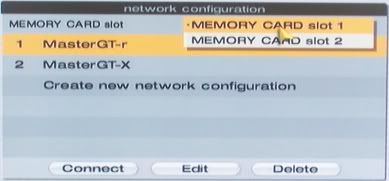
The consoles will now try to communicate with each other. Check the connecting "dots", to make sure it is connecting as it should be. If you don't have a connection within about 10 seconds, something is set wrong. You do not have to stare at the "Waiting for connection..." screen for more than that.


Once everyone is connected, select your track, car and driving options.


After all cars are selected and adjusted, you will get the 3, 2, 1, 0 Pre-Grid countdown and a LAN race will start.

Let's race!
If you want an audience to watch their own monitor while the drivers race, you need to configure at least one console station to handle this job. This station can be used to connect a DVD recorder, for recording during a race, recording using the replay, or both.
A Live monitor is a bit different than all of the others on the LAN. You must have a minimum of 2 consoles on the LAN: 1 host, and 1 monitor, but you would normally want more players. The host needs to include the right number of consoles on the LAN, including the count of Live consoles. For the minimum set-up just mentioned, that would be 2. The non-host players are set up normally, but the Live configuration needs some close attention because the game's on-screen instructions are partially incorrect.
Go to Options/LAN Settings and configure each Live console as you would a non-host, with any name (it won't show on-screen) and with a Live Style. Make sure that the Replay Target text entry gadget is blank or you will not see a normal broadcast or replay! If you enter any text at all in the Replay Target gadget, the cameras will not focus on a car and will point in unusual directions. The scrolling instructions tell you to do the opposite, but don't follow them because it won't work right. Leave Monitor Position set to Center and Monitor Type set to Normal.
Before a race starts, a Live monitor will have a blank pattern screen. When the race starts, it will change to a normal bumper-cam view (Center) and you have two views from which to choose: 1st person and dettached 3rd person. You cannot turn off the music by pressing the "O" button, though, if it is turned on for that console. The Up and Down arrow keys will switch the cars in focus sequentially, forward or backward.
- assemble all hardware normally and link all consoles to the router (use no crossover cables), run the game
- select the cars and the tracks you want to use and race conditions (number of laps, etc.), in general, for Arcade mode
- turn off Auto Connect, until the LAN works
- make a network config file for each console, if there isn't one,
and name it appropriately
- set which console is the host and which are for players
- set the number of players to the exact number of consoles
connected to the network
- turn on DHCP
- save your new settings, if you want to make them permanent
- join the LAN (watch the dots to see if it is working) and race
Select Multi-LAN Race. This mode will let you start a LAN race or start a Multi-monitor session.

If you have no network config file on the memory card now, when you try to enter LAN mode, you will be prompted with a notice and a requester which leads you to making one. Click OK and accept the following settings as they are.


You are then presented with the actual IP configuration menu and its Name is blank.

Enter the player's name using either the virtual keyboard or a real keyboard. This name will only identify the player in the Pre-Grid screen (it would have IDed the player while on-line, if GT4 had an on-line mode). You can ignore the Authentication settings, since they deal with signing-in while on-line. Leave "Use DHCP" and "Use auto DNS" set to "Yes" and click OK to save the configuration file. Once you have created and saved an IP configuration, you may never need to change it again, so long as nothing else about the network changes, of course.


After you accept the IP configuration, you are then shown all available configurations. At first, you will only have one, but you could have more if you join different LANs, so tag the different configs to identify how they are to be used. If you only have one configuration, then it won't matter how your configuration is named. Select the config you need and click on Connect . Note that some consoles will take a couple of seconds to display the config list, so be patient if your console is slower than others on the network. In the future, you may want to make changes to your configuration, or make a new one, and the menu below lets you do that.

The consoles will now try to communicate with each other. Check the connecting "dots", to make sure it is connecting as it should be. If you don't have a connection within about 10 seconds, something is set wrong. You do not have to stare at the "Waiting for connection..." screen for more than that.


Once everyone is connected, select your track, car and driving options.


After all cars are selected and adjusted, you will get the 3, 2, 1, 0 Pre-Grid countdown and a LAN race will start.

If you want an audience to watch their own monitor while the drivers race, you need to configure at least one console station to handle this job. This station can be used to connect a DVD recorder, for recording during a race, recording using the replay, or both.
A Live monitor is a bit different than all of the others on the LAN. You must have a minimum of 2 consoles on the LAN: 1 host, and 1 monitor, but you would normally want more players. The host needs to include the right number of consoles on the LAN, including the count of Live consoles. For the minimum set-up just mentioned, that would be 2. The non-host players are set up normally, but the Live configuration needs some close attention because the game's on-screen instructions are partially incorrect.
Go to Options/LAN Settings and configure each Live console as you would a non-host, with any name (it won't show on-screen) and with a Live Style. Make sure that the Replay Target text entry gadget is blank or you will not see a normal broadcast or replay! If you enter any text at all in the Replay Target gadget, the cameras will not focus on a car and will point in unusual directions. The scrolling instructions tell you to do the opposite, but don't follow them because it won't work right. Leave Monitor Position set to Center and Monitor Type set to Normal.
Before a race starts, a Live monitor will have a blank pattern screen. When the race starts, it will change to a normal bumper-cam view (Center) and you have two views from which to choose: 1st person and dettached 3rd person. You cannot turn off the music by pressing the "O" button, though, if it is turned on for that console. The Up and Down arrow keys will switch the cars in focus sequentially, forward or backward.
This mode is not really a LAN mode, but
many players still have a few common questions and problems with it.
2-Player Battle Mode allows 2 players to use one PS2 console with one TV.
Only one game disc and two controllers (or compatible USB wheels) and are required. One or two memory cards are optional.
Either A-spec or B-spec races can be played. (B-spec? My B-spec driver is better than your B-spec driver? What nonsense!)
If the console is set to use a wide-screen TV (Options/Screen), the screen will be split vertically, otherwise the split will be horizontal for a 4:3 TV. This split is controlled by the game, not the players, but if you are willing to play with a distorted aspect ratio, you can change the game's setting to use a 4:3 screen when, in fact, you are using a wide-screen TV. This will allow using a horizontal split on a wide-screen. Because of this kind of lack of control over your environment, try to use a LAN whenever possible.
In Options/Arcade Mode/2 Player Battle, there are settings for:
• No. of Laps (1 to 50)
• Tire Wear (None, Mild or Strong)
• Handicap (-150 to +150)
• Boost (None, Mild or Strong)
Can 2-Player Battle Mode play back replays in full-screen mode?
No.
Can 2-Player Battle Mode replays be saved?
No.
Can 2 PS2 consoles be networked together with a crossover cable and use 2-Player Battle Mode to get 4 players on 2 TVs?
No. Make a GT4 LAN for more than two players.
How do I turn on driver aids in 2-Player Battle Mode?
It seems GT4 has an Options/ArcadeMode/Driving Aids bug. Even if you save your game after selecting Traction Control, after you have played in Arcade, the setting will be reset to "None". As far as I can tell, this setting won't turn TCS on.
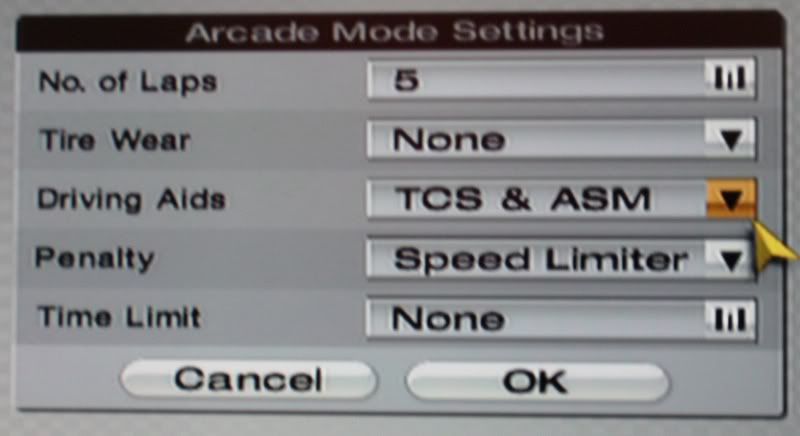
Someone else wrote: "Go to your garage, select the car you want, go to settings, adjust TCS to what you need. Go back to 2p arcade and you shouldn't have TCS problems." I tried this, set the car's TCS to 10, but found nothing was different - the tires still spun.
So, as far as I can tell, GT4's Arcade TCS does not work.
How can custom car settings be loaded in this mode?
In 2-player Mode, when you are chosing cars, there are some selections at the very top-right. These are "1", "2", and "Favorites".
Choose 1 and your garage from memory card 1 will load and then you can choose from any of your cars.
2-Player Battle Mode allows 2 players to use one PS2 console with one TV.
Only one game disc and two controllers (or compatible USB wheels) and are required. One or two memory cards are optional.
Either A-spec or B-spec races can be played. (B-spec? My B-spec driver is better than your B-spec driver? What nonsense!)
If the console is set to use a wide-screen TV (Options/Screen), the screen will be split vertically, otherwise the split will be horizontal for a 4:3 TV. This split is controlled by the game, not the players, but if you are willing to play with a distorted aspect ratio, you can change the game's setting to use a 4:3 screen when, in fact, you are using a wide-screen TV. This will allow using a horizontal split on a wide-screen. Because of this kind of lack of control over your environment, try to use a LAN whenever possible.
In Options/Arcade Mode/2 Player Battle, there are settings for:
• No. of Laps (1 to 50)
• Tire Wear (None, Mild or Strong)
• Handicap (-150 to +150)
• Boost (None, Mild or Strong)
Can 2-Player Battle Mode play back replays in full-screen mode?
No.
Can 2-Player Battle Mode replays be saved?
No.
Can 2 PS2 consoles be networked together with a crossover cable and use 2-Player Battle Mode to get 4 players on 2 TVs?
No. Make a GT4 LAN for more than two players.
How do I turn on driver aids in 2-Player Battle Mode?
It seems GT4 has an Options/ArcadeMode/Driving Aids bug. Even if you save your game after selecting Traction Control, after you have played in Arcade, the setting will be reset to "None". As far as I can tell, this setting won't turn TCS on.

Someone else wrote: "Go to your garage, select the car you want, go to settings, adjust TCS to what you need. Go back to 2p arcade and you shouldn't have TCS problems." I tried this, set the car's TCS to 10, but found nothing was different - the tires still spun.
So, as far as I can tell, GT4's Arcade TCS does not work.
How can custom car settings be loaded in this mode?
In 2-player Mode, when you are chosing cars, there are some selections at the very top-right. These are "1", "2", and "Favorites".
Choose 1 and your garage from memory card 1 will load and then you can choose from any of your cars.
Check out picking tires.
Checkout picking tracks.
Copyright © 2005-2007 MasterGT